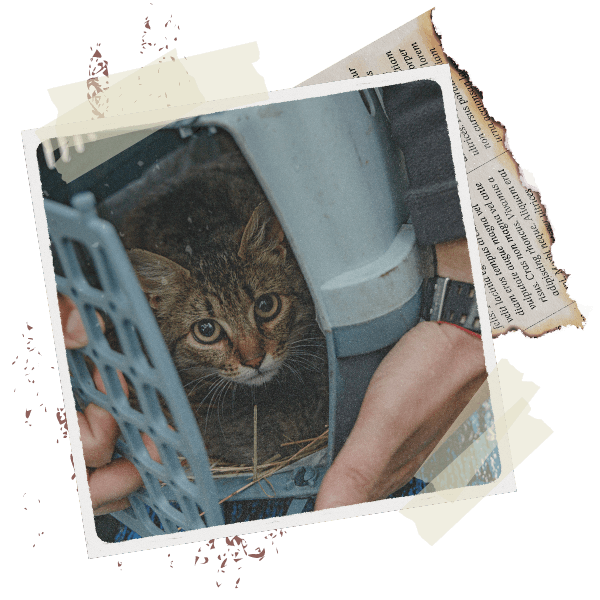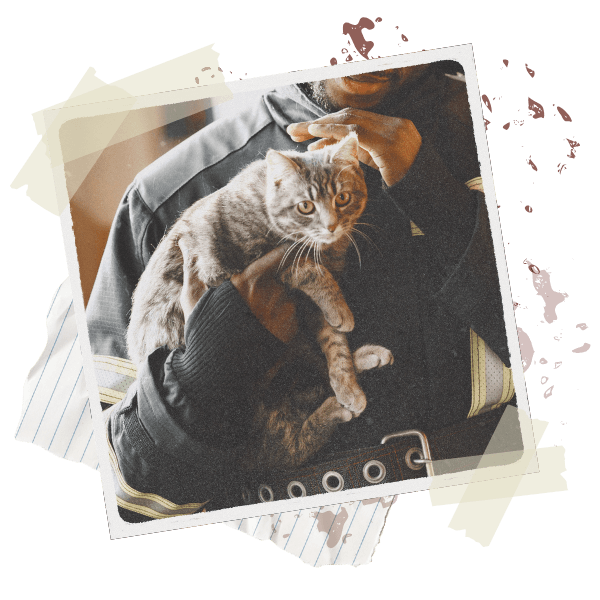Photo credit: © Getty Images
Together, let’s call on the Quebec government to include animals in emergency management plans.
Our animals, overlooked in times of crisis
Floods, wildfires, landslides, ice storms… Natural disasters are no longer rare events. No one is truly safe.
In an emergency, it’s normal to want to protect your family. And for more than half of Quebec households, that includes an animal.
And yet, animals are currently left out of the provincial emergency planning and response framework. Their rescue and care in the event of a disaster depend entirely on the goodwill of municipal authorities, which are under no obligation to include animals in their evacuation or relief plans.
The result? In the midst of a crisis, people are forced to evacuate their homes, broken-hearted at having to leave their companions behind. Some people refuse to leave without their animals, thus jeopardizing their own safety and that of first responders. Abandoned animals, meanwhile, are left stranded, unable to escape the unfolding disaster.

Photo credit: © Ozan Acidere/We Animals Media
It's time for things to change. That's why we are calling on the Quebec government to implement concrete measures to better protect animals in the event of a disaster.
Photo credit: © akaratwimages

Photo credit: © Anzhelika Kozachenko/We Animals Media
Our appeal to the government
We call on the Quebec government to include animals at all levels of disaster planning and response throughout the province, specifically by:
- Including animals in evacuation and emergency housing plans
- Working with animal shelters and animal protection organizations to conduct animal search and rescue operations, namely by ensuring access to at risk or affected areas
- Implementing measures to make it easier to identify animals and reunite them with their guardians
- Training first responders in animal capture and handling
- Supporting animal shelters affected by a disaster
- Making essential animal food and supplies eligible for post-emergency financial assistance.
Photo credits: © Bumble-Dee, Getty Images, Ozan Acidere/We Animals Media
Do you want to ensure your animal’s safety in the event of a disaster?
For the inclusion of animals in Quebec’s emergency management plans:
sign this letter addressed to the Minister of Public Security!
Photo credits: © Bumble-Dee, Getty Images, Ozan Acidere/We Animals Media
A matter of public safety
According to the most recent data, 52% of Quebec households include a dog or cat. And 86% of Quebecers living with a dog or cat would refuse to evacuate their home without their animal in the event of a disaster.
Scientific literature, expert opinion and experience in the field confirm that failing to adequately provide for animals during disasters can cause people to put themselves in danger in order to stay with their animals or rescue them, thereby also jeopardizing the safety of responders, and hinder the psychological recovery of disaster victims.
Ignoring this reality means exposing everyone to unnecessary risks: humans, animals… and first responders who have to provide assistance in already dangerous conditions.

Photo credit: © Jo-Anne McArthur/We Animals Media

Get ready now
Rescue teams who enter disaster zones after evacuations sometimes encounter horrific scenes: animals who have starved to death after being chained outside or locked alone in a house, next to an empty bag of food. These tragic scenes remain forever etched in the memories of everyone involved.
Changing regulations is important. But being properly prepared is just as important. Download our free emergency preparedness guide to help you ensure your animal’s safety in the event of a disaster.
The guide includes:
- A list of essential items to have on hand;
- Practical tips on how to evacuate your home quickly;
- A simple plan for the whole family.
Photo credits: © Pexels, Vivienne Giames/We Animals Media
All family members should be covered by government emergency management plans.
Disasters are sometimes unavoidable. Leaving an animal behind should never be.
Questions? Here’s what you need to know.
Download our free guide. This document includes advice on what to do in the event of an emergency or disaster. It also contains a list of essential items you should assemble in an emergency kit, as well as precautions to take beforehand, such as microchipping your animal to make identification and reunification with you easier should you become separated.
Civil security is a shared responsibility between citizens, municipal authorities, and the Quebec government. Currently, animals are left out of the provincial laws, regulations, and policies relating to emergency preparedness. Whether or not animals are provided for during emergencies depends on each municipality.
Municipalities bear the primarily responsibility for protecting people and property within their territory in the event of a disaster, particularly with regard to alert and mobilization procedures, as well as basic emergency response measures, such as evacuations and temporary shelter for citizens.
Although the Quebec government regulates municipalities’ civil security responsibilities, current regulations do not require them to include animals in their emergency preparedness plans. This means that whether animals are included in evacuation procedures, for example, depends on the willingness of each individual municipality.
In addition to overseeing the responsibilities of municipalities in terms of civil security, the provincial government is responsible for setting provincial guidelines and objectives for civil security, promoting best practices, and facilitating coordination between stakeholders. It also establishes financial assistance and compensation programs for disaster victims. Currently, animals are entirely excluded from provincial civil security laws and policies.
Unfortunately, this is a possibility. For more specific information, contact your municipality. To prepare for such a situation, consult our guide.
From both an animal welfare and public safety perspective, it has become vital to recognize the importance of including animals in government emergency preparedness plans.
The Quebec government must take action and include animals in disaster planning and response at all levels, namely by:
- Recognizing the role of animal shelters and animal welfare organizations in emergency response and including them as stakeholders at every stage from preparation and consultation to collaboration and information sharing
- Including animals in evacuation and emergency housing plans
- Training first responders in animal capture and handling
- Working with animal shelters and animal protection organizations to conduct animal search and rescue operations, specifically by ensuring access to at risk or affected areas
- Implementing measures to make it easier to identify animals and reunite them with their guardians
- Supporting animal shelters affected by a disaster
- Making essential animal food and supplies eligible for post-emergency financial assistance.
There are nearly 4 million households in Quebec,¹ 52% of which include a dog or cat. Failing to take animals into account during emergencies–especially in the context of climate change, which is leading to more intense and increasingly common extreme weather events–could result in huge losses of animal life. For example, an estimated 50,000 to 70,000 companion animals died during Hurricane Katrina in 2005.²³
Scientific literature, expert opinions, and experience on the ground all confirm that failing to adequately provide for animals during a disaster can hinder evacuation efforts and put people and rescuers at greater risk. In the event of an evacuation, for example, a significant portion of the population may refuse to leave without their animals or may return to a dangerous area to rescue them, thereby putting their own safety and that of rescuers at risk.⁴⁵⁶ The Quebec government itself recognizes this risk factor, stating that “during a disaster, some people refuse to evacuate their homes because they do not want to abandon their companion animals.”⁷
In fact, according to an August 2025 poll conducted by Léger on behalf of the SPCA, 86% of Quebecers living with a dog or cat would refuse to evacuate their home without their animal in the event of a disaster.
During the 2023 wildfires in Quebec, members of a northern Cree community were forced to evacuate without their dogs because there was no room for them in the airlift. As a result, two animal control officers risked their lives to remain on site for a week to care for the 80 dogs who had been left behind.⁸
Given the close bonds that people form with their animals, being forcibly separated from them or the animal dying during a disaster has significant emotional impacts and can hinder victims’ psychological recovery. In fact, a 2024 meta-analysis of more than 42 studies on this subject shows that forced separation between humans and animals during a disaster can cause diminished psychosocial functioning, impaired family functioning, increased psychological trauma, acute stress, and peritraumatic dissociation, all of which are significant predictors of post-traumatic stress disorder, as well as increased anxiety, trauma, and feelings of guilt.⁹
Furthermore, numerous studies demonstrate the positive impact of reuniting with an animal on the guardian’s ability to recover psychologically from such events.¹⁰ ¹¹ As one author summarizes, “[a]llowing pet owners to safely evacuate their animals with them during an emergency evacuation may prevent significant acute and long-term psychological trauma, and can strengthen the emotional resiliency of potentially vulnerable evacuees.”¹²
In 2023, British Columbia passed the Emergency and Disaster Management Act, which sets out the powers and responsibilities of the provincial government, public sector agencies, and local authorities. The new law draws on international best practices and requires local governments to include animals in risk assessment, emergency management and evacuation plans.
In the United States, the Pets Evacuation and Transportation Standards Act (“PETS Act”) was passed in 2006, shortly after Hurricane Katrina. This law requires states, cities and counties to take into account companion and service animals before, during and after a major disaster or emergency in order to qualify for federal funding.
The PETS Act allows the Federal Emergency Management Agency (FEMA) to provide funds to states and local communities for the for the creation, operation, and maintenance of animal-friendly emergency shelters, along with other emergency preparedness actions for companion and service animals. FEMA is also authorized to reimburse state and local governments for the rescue, care, and sheltering of animals in emergencies.
Since the Act was passed, over 30 states have amended their disaster relief plans to take into account the needs of companion and service animals.
By signing our letter today, you will give more weight to our appeal and help ensure that animals are no longer overlooked during disasters.
Photo credit: © welcomia






